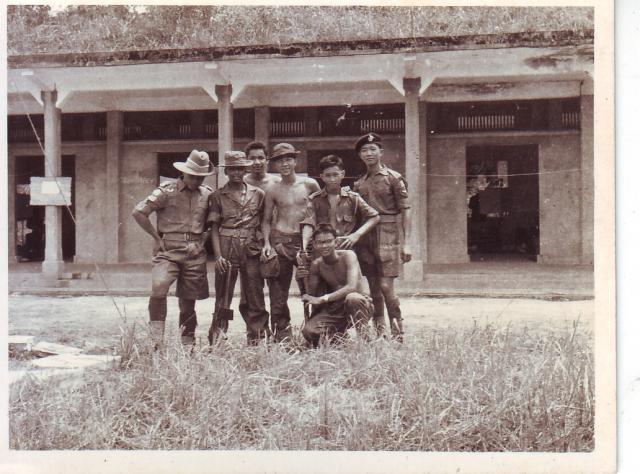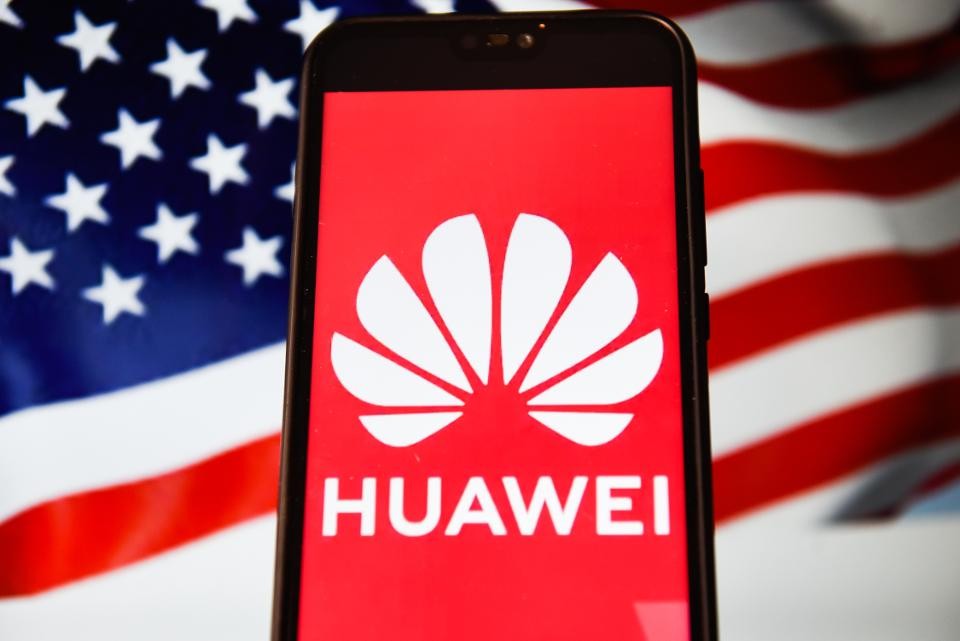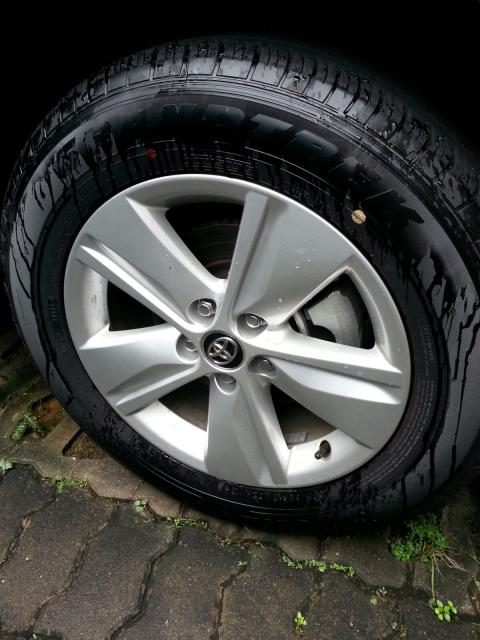Search the Community
Showing results for tags 'TRADE'.
-
Trump imposes 25% tariff on Chinese goodshttps://www.bbc.com/news/business-44498484?SThisFB
-
There's been some hype around these 2 stocks lately from earnings. I've got enough money to invest in just one, can't decide between the two. (p.s. I hold bit of Tesla, looking to diversify and for cheaper EV stocks)
-
Recently, by an incredible stroke of luck, I came across the website of the army boys trade school. https://sites.google.com/site/mybalep/Home My dad's name is inside but I shall keep it secret. By another stroke of luck, I managed to actually email someone from the site and he knew my dad personally. He is not in Singapore but he has emailed me photos which I have never seen before and given me locations of their meet ups. What is the army boys trade school? Basically boys from Singapore and Malaya would join this. This was under the British. It is a school where they learned soldiering and also got an education as well. From what I understand, this education was more of a technical education where they learneda sspecific skill. As part of the British army, they too fought for Singapore during the confrontation years. Yet I have never seen a mention of them in mindef magazines. And I have never met a single person outside of family who has actually heard of this school, not to mention known someone from there. So now I have this opportunity to meet them. I am of two minds. One is not to meet as it might be awkward as they do not know me, just my father and he passed away close to twenty years ago. On the other hand, these people are old and the list of those who died are getting longer. If I don't try, i might never get another chance. If you were me, would you? By the way my dad's picture is inside so if anyone knows anyone from this picture can message me privately.
- 35 replies
-
- 13
-

-
https://www.forbes.com/sites/zakdoffman/2019/11/11/huawei-has-defied-trumps-blacklist-so-what-happens-now/#1f4d92d17336 Huawei Has Defied Trump’s Blacklist: So What Happens Now? Zak Doffman Contributor, Cybersecurity Back in May, when U.S. President Trump stripped Huawei of its U.S. supply chain, the company’s short to medium term future looked bleak. The blacklist was aimed at 5G networking equipment, but it was Huawei’s consumer goods business that seemed to be hit hardest. Huawei execs forecast billions in lost revenue as CEO Ren Zhengfei talked survival: “It's good enough for us to just survive,” he told Bloomberg in May, “you can come back to interview us in two or three years and see if we still exist.” Fast forward six months, though, and it’s all change. “Huawei defies the odds to lead the global telecoms market after 180 days on the U.S. trade blacklist,” announced a South China Morning Post headline on November 8. “Performance,” it reported, “that has defied early predictions that it would stumble under the U.S. trade ban.” And this isn’t a slant on the truth—with this story, there are no rose-tinted spectacles in sight. Far from losing the hard-fought number two slot for global smartphone sales it won from Apple last year, Huawei has continued to grow, leaving Apple further behind and chasing down Samsung for the global crown. This year, the blacklisted company has shipped 200 million smartphones 64 days faster than it managed in 2018—pre-blacklist. Huawei targeted 2020 as the year it would overtake Samsung. It remains on course to do exactly that. Samsung is no slouch—according to Canalys it posted annualised growth of 11% in the third quarter this year—Huawei, though, hit 33%. So all good on the consumer front, but what about sales of 5G networking equipment. Well, despite the blacklist, Huawei still leads the world. In the first quarter of 2019, despite a relentless U.S. campaign against the company, Huawei’s market share was 28%. During the following quarter in which the blacklist was put in place, this increased to 29%. Second-placed Nokia remained a distance behind, at around 16%. Worse for the U.S., Reuters reported that half of Huawei’s 65+ 5G contracts are in Europe—the primary international battleground between Washington politicians and Shenzhen execs. A recent EU report warned of the dangers associated with a dominant 5G player from an authoritarian regime. But the two key battlegrounds, Germany and the U.K., remain undecided and could still opt for Huawei. If that happens, it is likely that other markets around the world will follow suit. If key markets, especially the U.K., allow Huawei into their networks, it undermines the U.S. case considerably. So what went wrong with the U.S. campaign? In a word—China. Huawei’s domestic market has pulled hard enough to make all the difference. Huawei’s overall growth was strong, but its performance in China was exceptional—a 66% increase catapulting the company to a 42% market share. The company is chasing down an extraordinary 50% market share of the world’s largest smartphone market—a market that has been a recent nightmare for both Apple and Samsung as they struggle to compete. Huawei eased past the $100 billion revenue mark last year for the first time, after a decade of uninterrupted growth. Against the odds, it looks set to do the same this year. There are three allegations behind the U.S. campaign against Huawei. The first that the company will facilitate espionage or data theft at the behest of China’s intelligence agencies if asked. The second that the company receives state subsidies at the expense of non-Chinese competitors. And the third that its technologies have been used to help suppress China’s ethnic minorities, most notably the Uighurs in Xinjiang. Underpinning Huawei’s defense against U.S. claims has been a carefully orchestrated media campaign that was underway before the sanctions were in place. Back in February, at the flagship Mobile World Congress event in Barcelona, Huawei hit back at the U.S. in front of its industry peers. The company’s chairman Guo Ping used a keynote speech to remind the world about the cybersecurity controversies emanating from the U.S. entered around the Edward Snowden revelations. As I wrote at the time, the approach has “all the hallmarks of a carefully orchestrated line of defense that has been in the works for some time—and it’s a very good one.” In short, that campaign hasn’t stopped since. We have seen a new transparency from Shenzhen, open access to the once reclusive CEO, an open-door policy at HQ, a growing team of Western media and PR professionals drafted in to shape the messages and manage the media. And those messages have focused on innovation, investment, legacy, history and performance. All underpinned by trust, loyalty and consistent denials of any security wrongdoing. Behind all this has been a darker message, though. Essentially Huawei is offering the world a choice. Take the U.S. line, swallow its tech dominance through the likes of Google, Apple, Microsoft, Amazon, Facebook and Qualcomm. Or push back, don’t take it all at face value, and support this leading non-U.S. player as it carves out a new way. The messaging around a replacement for Android itself or a replacement for Google Mobile Services aligns with this. The world’s consumers don’t want to move from Google, but in truth no company has offered them a viable alternative in a decade. Huawei has ridden out the storm. Between its 5G contracts and its smartphone market position it is well protected for another 12-18 months, with perhaps another 10% market share in China on offer to offset any slowing non-China sales. Beyond that, there are one of two paths open to the company. Either Google (and the others) will be returned under Commerce Department licenses, in which case the company will be even stronger, even more of a threat to its competition. Or the blacklist will hold, in which case the company will invest in Huawei Mobile Services and in an app ecosystem to wean millions to its new third way. Unless there is a significant change in the U.S. stance, this analysis on Huawei will continue back and forth. And the more the company is seen to ride out its sanctions, the more likely the U.S. will trade away more restrictions for trade talk benefits while they still carry some weight. Meanwhile, behind the scenes, U.S. tech giants continue to lobby for a return to business as usual. What is certain, is that there was no expectation that Huawei would field the first six months of its blacklist as well as it has. For the U.S. to campaign this strongly against a commercial enterprise is unprecedented—the result of that campaign, though, is arguably even more so.
-
Hi all, I am thinking to buy a new car, as for my current car, I am not sure whether to trade in or sell by my own, the easiet way will be trade in to the car agent, but this agent beign a middle man/lady, will earn few $K from me (eg., 2nd dealer quote him $30K, they will come back and tell me only $28K, and they pocket $2K). Selling by my own, then I do not know any good and reputated 2nd car dealer. Any suggestion from you? Thank you.
-
Some need to trade in car in order to enjoy the $5k discount etc. How much do they really make from trade in car or they are averaging out by earning some and losing some? If I push in a very basic or run down coe car the 5k seems not bad an offer for the body isn't it?
-
Hi all, I'm new to this forum.. I want to trade in my new Totoya Harrier 17" rims & tyres. Any recommendation where to do it?
-
This is what i was trying to stress in previous thread, many of us can choose to slow down, but if the whole country is slowing down to have the work-life balance, who is going to cheong out there to make sure the economy continue to perform and sustain? Fortunately there are still ambitious young graduates (despite some strawberry) who are hardworking. On the other hand, we also see many members acknowledge the trade off (income vs time) at personal level, but at the national level, things will not be good. Dun turn this into bashing, we can discuss about your personal choice and the trade off.
-
For those guys who are getting new rides do you trade in your car or keep both? 1) as first owner kept it in tip top (always service with dealer) 2) dealers lowballig 3) FOMO, 4) low mileage 5) more painful financially in the long run 6) can use spare car for reservist How about sentimental value?
-
I am seriously keen in working with him to get it to a professional level
-
Hi all, i would like to use this thread to share information when you are looking to trade in your cars to dealers. By making use of this information here, we can provide the trade in price that the dealers are offering for your current car, then the people who browse this thread can also offer you a price that is above what the dealer quotes you. WIN WIN for both sellers and buyers. Sellers can to sell their cars at prices higher than what dealers offer, buyers can buy used car at a much more reasonable price. Hope that i can start this thread to make buying/selling prices more reasonable, more transparent. format as shows. Make: Model Colour COE Mileage OMV Handover date Dealer $$$
-
I'm just thinking of selling my Toyota Vios, and may want to try Trade Assist instead of selling to Car Dealers, any bros here has experience with them? Is there anything that I should be extra cautious? Thanks.
- 79 replies
-
- experience
- with
-
(and 2 more)
Tagged with:
-
Hi Guys, If I were to broker a business transaction between 2 companies, is there a way whereby I can get the supplier or buyer to sign a legal document giving me a return for the deal without setting up a company myself? (i.e. I am represented by myself and not a company). Need advice from bros here If No 1 is possible, can I get the companies to sign an NDA with me? Appreciate advice from bros who are knowledgeable in legal terms.. Thanks !!
-
I just changed my stock to 18" rims and Nexen n7000 (225/40z/R18) in early May. But the wife absolutely hates the nose and bumpier ride compared to my previous stock, so i am looking to trade them in with some cash for 15" or 16" rims and relatively new tyres (especially ideal for bros with new cars looking for rim upgrade). My 18" rims and tyres comes with unlimited rotation. Interested bros can contact me at 9337 6797, many thanks.
-
Oil prices fell in Asia Wednesday following a three-day rally as dealers were divided on whether the commodity has bottomed out after a plunge of nearly 60% since June, analysts said. US benchmark West Texas Intermediate (WTI) for March delivery fell 94 cents to US$52.11 (RM185.73) while Brent crude for March eased 47 cents to US$57.44 in mid-morning trade. WTI soared US$3.48 to US$53.05 Tuesday, its highest close since December 31, while Brent jumped US$3.16 to US$57.91, its best reading since December 30, as dealers cheered signs that the oil industry is tightening exploration activities to cap a supply glut. Ken Hasegawa, an energy trading manager at Newedge Group in Tokyo, said the crude market was "extremely volatile" after the three-day rally that began Friday saw prices surge nearly 20%. "It has become increasingly difficult to discern the direction of the prices of crude oil, but the fundamentals remain unchanged," Hasegawa told AFP. He added that prices could "fluctuate by increasing up to US$10 and falling up to US$10" in the short term. Deep cuts in capital spending by major oil companies, including new announcements Tuesday by BP and BG Group, had suggested there would be tighter supplies in the future. Last week, The Baker Hughes North America rig count report for the week to January 30 showed a drop of 128 rigs to 1,937. That compared with 2,393 a year ago. Some analysts however remain doubtful that the current oil price rebound will be sustained as supplies still outweigh demand in the immediate term. The oil market has lost more than half its value since June, when crude cost more than US$100 a barrel, largely due to a surge in global reserves boosted by robust US shale oil production. The problem was exacerbated in November after the Opec cartel insisted that it would maintain output levels despite plunging prices. The 12-nation group pumps about 30% of global crude. – AFP, February 4, 2015.
-
How do you guys see such a move? Free travel within ASEAN? Possibility of same currency and etc....Personally, I foresee many issue such as the nearby countries crime starts to flood Singapore. Afterall, not all the Asean countries have the same economic development level. ASEAN to declare single market but delays deeper integration: Malaysia https://sg.news.yahoo.com/asean-declare-single-market-delays-deeper-integration-malaysia-134610829.html?linkId=11937214 ASEAN will officially call itself a single market by year's end, but "big things" like seamless travel within the 10-nation bloc would only come in 2020, Malaysia's trade minister told AFP in an interview. "We're going to declare ourselves as an ASEAN Economic Community," said Mustapa Mohamed, whose country holds the rotating presidency of the Southeast Asian bloc this year. "We don't have complete integration or harmonisation yet, 2015 is laying the stage for bigger things to come," he said on the sidelines of the World Economic Forum in Davos. "We're going to get almost there by 2015 but the big things like seamless travel... would come in 2020. "What's important is that we're committed, I'm not saying that we're backtracking," added the minister. The Southeast Asian bloc, a market of about 600 million people, had set 2015 as a deadline for integrating the region's vast economies into a single European Union-style market, with tariffs abolished and free movement of skilled workers. But there is much scepticism that the targets could be met, as the bloc is made up of countries in vastly different stages of economic development. Myanmar, for instance, is just opening up its economy after decades of isolation over its outright military rule which came to an end in 2011. At the opposite end of the spectrum is Singapore, which ranks among the world's richest nations. Mustapa acknowledged that it would only be "in 2020 that you'll see more progress in ASEAN economic integration" in term of the abolishing of non-tariff barriers, and flow of skilled labour. By year's end, there will be "freer movement of goods and services but not free movement of goods and services." The business community has been pushing political leaders to move faster on integration, but Mustapa said the ASEAN model is gradual. "The business community wants ASEAN to be integrated as one entity. The fact is that there are border issues, customs, immigration, and different regulations," he said. In addition, there is little understanding among the general public on how a single market can change their lives, said the minister. "Some fear that they would be robbed of their jobs, that come December 2015, I'll be out of job because my Malaysian friend is coming over," he said. "We need to do a lot more in terms of communication." Asked if Europe's recent economic woes over heavily indebted member states like Greece had put off integration plans, Mustapa said that "from day one, we know that we're not going to adopt the EU model". A single currency or a parliament were never part of the bloc's plans, he said. ASEAN groups together Brunei, Cambodia, Indonesia, Laos, Malaysia, Myanmar, the Philippines, Singapore, Thailand and Vietnam.
-
Hi all,any idea where can find shop dat trade-in older version of Gameboy Advance SP for the newer version of Gameboy DS (dual screen)? There used 2 be a shop in clementi central dat does dat trading, but the shop close down due upgrading. Understand they had another shop in Yishun but dun knoe where leh? Any help here? Or any shop dat u guys knoe around yr neighbour hood does this kinda trading? TQ!!!
-
Need help as what stated on the subject. Do I meed to inform the dealer on this? Will the trade in value reduce?
- 23 replies
-
- car accident
- accident
-
(and 3 more)
Tagged with:
-
Cargill Inc., the agriculture and trading giant, said Thursday that it would close a division that trades coal, as well as European power and gas, after a strategic review of the businesses. Cargill, one of the world's largest privately owned companies, said in a statement that it is exiting the businesses because of "significant changes in the coal and European power and gas markets." It didn't identify those changes. Separately, Cargill and Copersucar SA, a Brazilian sugar and ethanol trader, agreed to combine their global sugar-trading activities, creating a new joint venture that will source and trade sugar. The Geneva-based energy-trading operation Cargill is closing is part of its energy, transportation and metals division. Cargill estimates it buys nearly $5 billion of energy a year. Reduced coal consumption in some countries, such as the U.S., has lifted global supplies of coal in recent years and depressed prices, intensifying competition for markets that still need the fuel. Coking coal, used for making steel, is trading at its lowest level in eight years, while prices of thermal coal, used in power generation, are the weakest since 2009. Cargill said it would continue to trade in petroleum, petrochemicals, iron ore and steel, ocean freight and North American gas and power markets. Last month, SparkSpread.com, an energy-market publication, reported that Cargill suffered losses of at least $100 million trading in energy markets early this year, mostly in mid-Atlantic power markets. The publication didn't cite a source for its information. Pete Stoddart, a spokesman for Cargill, said Thursday that the company doesn't disclose the results of individual business units, but said the $100 million-loss figure was inaccurate. He said the decision to exit the coal and European power businesses was unrelated to the U.S. power operation. The Cargill-Copersucar sugar venture will be 50%-owned by each company. Other financial terms weren't disclosed. The venture will benefit from a large supply of sugar from Copersucar's partner mills in Brazil, the world's largest sugar producer and exporter, and from both companies' logistics-management experience, the companies said. The venture's trading activities will be based in Geneva, with offices in locations including Hong Kong, São Paulo, Brazil; Miami, Moscow and Dubai. Ivo Sarjanovic, who leads Cargill's sugar business, will be chief executive once the new company is formed, which is expected in the second half of 2014. Copersucar Chairman Luis Roberto Pogetti will become the first chairman of the venture, a post that will rotate. Both companies' ethanol businesses and fixed assets, such as terminals and mills, are excluded from the transaction. Each company will continue to own its own logistics and infrastructure facilities, but these will serve the joint venture, according to a spokesman for Copersucar. The deal will help Copersucar shore up its logistics reach after a massive fire in October damaged six of its Brazilian sugar warehouses, used to store and ship sugar at the port of Santos. Shipments of sugar from the port dropped by about 40% after the fire. Copersucar is repairing its Santos terminal and by February 2015 expects to have the capacity to receive and ship 10 million tons of sugar a year, an average of about 800,000 to a month, up from a current 250,000 a month. The deal comes as other commodity companies have struggled in the sugar business. Bunge Ltd. last month said it hired Morgan Stanley to advise on a strategic review of its money-losing sugar milling operation, which has been hurt by low world sugar prices and caps on the price of ethanol produced from sugar cane in Brazil. Archer Daniels Midland Co., in financial results reported in February, recorded a $50 million impairment of its investment in a Brazilian sugar mill, based on a new assessment of future cash flows from the business. Cargill, founded in 1865, has diverse operations including processing meat, selling steel and making pharmaceutical ingredients, in addition to trading grain, energy and other commodities and transporting goods across a sprawling global logistics network.
-
I always have this mindset when it comes to buy things, products and services. Especially when i am servicing my car or intending to upgrade some of the parts. When you are looking for cheap and good, it will not be fast. when you are looking for good and fast, it will not be cheap. when you are looking for fast and cheap, it will not be good. Just my 2 cents if thoughts! Do give me your opinion on this!
-
A visitor checking out a car at the Volkswagen Centre showroom on 23 Dec 2012. In a bid to rev up business squeezed by loan curbs introduced six months ago, motor firms are starting to roll out no-frills car leasing plans which require lower monthly payments. In a bid to rev up business squeezed by loan curbs introduced six months ago, motor firms are starting to roll out no-frills car leasing plans which require lower monthly payments. They come on the back of "traditional" leasing plans introduced as early as May to woo buyers. But response from drivers has been lukewarm, despite advertising and marketing efforts by several firms to drum up interest. Perhaps it is still early days, but Mr Anthony Lim, director of credit company Kenso Leasing, said: "It's the Asian mentality that... only those who can't afford to buy, lease." Source: http://www.straitstimes.com/breaking-news/...rs-hop-20130817
-
As above. Say if AD provides a service to pick up OPC cars for servicing from owners home. Can they use trade plate on the car during peak hour pick up so that owner doesnt have to pay for e licence? Question is what if the car passes a ERP gantry? Gantry wouldnt know if a trade plate is used right? Will kena or kong?
-
Will easing up in cost further lower price of cars imported from EU? http://www.channelnewsasia.com/stories/sin...1243082/1/.html
-
Normally does tyre shop take in new car tyres straight out of showroom at better price?

















